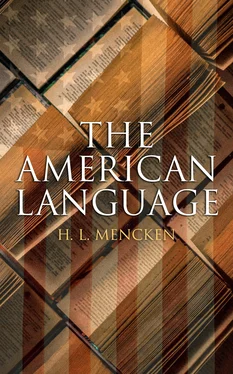"That struggle," adds Lossing, "occurred, and that independence was won, by the Americans in the War of 1812." 2In the interval the new republic had passed through a period of Sturm und Drang whose gigantic perils and passions we have begun to forget—a period in which disaster ever menaced, and the foes within were no less bold and pertinacious than the foes without. Jefferson, perhaps, carried his fear of "monocrats" to the point of monomania, but under it there was undoubtedly a body of sound fact. The poor debtor class (including probably a majority of the veterans of the Revolution) had been fired by the facile doctrines of the French Revolution to demands which threatened the country with bankruptcy and anarchy, and the class of property-owners, in reaction, went far to the other extreme. On all sides, indeed, there flourished a strong British party, and particularly in New England, where the so-called codfish aristocracy (by no means extinct, even today) exhibited an undisguised Anglomania, and looked forward confidently to a rapprochement with the mother country.3 This Anglomania showed itself, not only in ceaseless political agitation, but also in an elaborate imitation of English manners. We have already seen, on Noah Webster's authority, how it even extended to the pronunciation of the language.
The first sign of the dawn of a new national order came with the election of Thomas Jefferson to the Presidency in 1800. The issue in the campaign was a highly complex one, but under it lay a plain conflict between democratic independence and the old doctrine of dependence and authority; and with the Alien and Sedition Laws about his neck, so vividly reminiscent of the issues of the Revolution itself, Adams went down to defeat. Jefferson was violently anti-British and pro-French; he saw all the schemes of his political opponents, indeed, as English plots; he was the man who introduced the bugaboo into American politics. His first acts after his inauguration were to abolish all ceremonial at the court of the republic, and to abandon spoken discourses to Congress for written messages. That ceremonial, which grew up under Washington, was an imitation, he believed, of the formality of the abhorrent Court of St. James; as for the speeches to Congress, they were palpably modelled upon the speeches from the throne of the English kings. Both reforms met with wide approval; the exactions of the English, particularly on the high seas, were beginning to break up the British party. But confidence in the solidarity and security of the new nation was still anything but universal. The surviving doubts, indeed, were strong enough to delay the ratification of the Twelfth Amendment to the Constitution, providing for more direct elections of President and Vice-President, until the end of 1804, and even then three of the five New England states rejected it,4 and have never ratified it, in fact, to this day. Democracy was still experimental, doubtful, full of gunpowder. In so far as it had actually come into being, it had come as a boon conferred from above. Jefferson, its protagonist, was the hero of the populace, but he was not of the populace himself, nor did he ever quite trust it.
It was reserved for Andrew Jackson, a man genuinely of the people, to lead and visualize the rise of the lower orders. Jackson, in his way, was the archetype of the new American—ignorant, pushful, impatient of restraint and precedent, an iconoclast, a Philistine, an Anglophobe in every fibre. He came from the extreme backwoods and his youth was passed amid surroundings but little removed from downright savagery.5 Thousands of other young Americans like him were growing up at the same time—youngsters filled with a vast impatience of all precedent and authority, revilers of all that had come down from an elder day, incorrigible libertarians. They swarmed across the mountains and down the great rivers, wrestling with the naked wilderness and setting up a casual, impromptu sort of civilization where the Indian still menaced. Schools were few and rudimentary; there was not the remotest approach to a cultivated society; any effort to mimic the amenities of the East, or of the mother country, in manner or even in speech, met with instant derision. It was in these surroundings and at this time that the thorough-going American of tradition was born: blatant, illogical, elate, "greeting the embarrassed gods" uproariously and matching "with Destiny for beers." Jackson was unmistakably of that company in his every instinct and idea, and it was his fate to give a new and unshakable confidence to its aspiration at the Battle of New Orleans. Thereafter all doubts began to die out; the new republic was turning out a success. And with success came a vast increase in the national egoism. The hordes of pioneers rolled down the western valleys and on to the great plains.6 America began to stand for something quite new in the world—in government, in law, in public and private morals, in customs and habits of mind, in the minutia of social intercourse. And simultaneously the voice of America began to take on its characteristic twang, and the speech of America began to differentiate itself boldly and unmistakably from the speech of England. The average Philadelphian or Bostonian of 1790 had not the slightest difficulty in making himself understood by a visiting Englishman. But the average Ohio boatman of 1810 or plainsman of 1815 was already speaking a dialect that the Englishman would have shrunk from as barbarous and unintelligible, and before long it began to leave its mark upon and to get direction and support from a distinctively national literature.
That literature, however, was very slow in coming to a dignified, confident and autonomous estate. Down to Jefferson's day it was almost wholly polemical, and hence lacking in the finer values; he himself, an insatiable propagandist and controversialist, was one of its chief ornaments. "The novelists and the historians, the essayists and the poets, whose names come to mind when American literature is mentioned," says a recent literary historian, "have all flourished since 1800."7 Pickering, so late as 1816, said that "in this country we can hardly be said to have any authors by profession." It was a true saying, though the new day was about to dawn; Bryant had already written "Thanatopsis" and was destined to publish it the year following. Difficulties of communication hampered the circulation of the few native books that were written; it was easier for a man in the South to get books from London than to get them from Boston or New York, and the lack of a copyright treaty with England flooded the country with cheap English editions. "It is much to be regretted," wrote Dr. David Ramsay, of Charleston, S. C., to Noah Webster in 1806, "that there is so little intercourse in a literary way between the states. As soon as a book of general utility comes out in any state it should be for sale in all of them." Ramsay asked for little; the most he could imagine was a sale of 2,000 copies for an American work in America. But even that was far beyond the possibilities of the time.
An external influence of great potency helped to keep the national literature scant and timorous during those early and perilous days. It was the extraordinary animosity of the English critics, then at the zenith of their pontifical authority, to all books of American origin or flavor. This animosity, culminating in Sydney Smith's famous sneer,8 was but part of a larger hostility to all things American, from political theories to table manners. The American, after the war of 1812, became the pet abomination of the English, and the chief butt of the incomparable English talent for moral indignation. There was scarcely an issue of the Quarterly Review, the Edinburgh, the Foreign Quarterly, the British Review or Blackwood's, for a generation following 1814, in which he was not stupendously assaulted. Gifford, Sydney Smith and the poet Southey became specialists in this business; it took on the character of a holy war; even such mild men as Wordsworth were recruited for it. It was argued that the Americans were rogues and swindlers, that they lived in filth and squalor, that they were boors in social intercourse, that they were poltroons and savages in war, that they were depraved and criminal, that they were wholly devoid of the remotest notion of decency or honor. The Foreign Quarterly, summing up in January, 1844, pronounced them "horn-handed and pig-headed, hard, persevering, unscrupulous, carnivorous, with a genius for lying." Various Americans went to the defense of their countrymen, among them, Irving, Cooper, Timothy Dwight, J. K. Paulding, John Neal, Edward Everett and Robert Walsh. Paulding, in "John Bull in America, or, the New Munchausen," published in 1825, attempted satire. Even an Englishman, James Sterling, warned his fellow-Britons that, if they continued their intolerant abuse, they would "turn into bitterness the last drops of good-will toward England that exist in the United States." But the avalanche of denunciation kept up, and even down to a few years ago it was very uncommon for an Englishman to write of American politics, or manners, or literature without betraying his dislike. Not, indeed, until the Prussian began monopolizing the whole British talent for horror and invective did the Yankee escape the lash.9
Читать дальше












